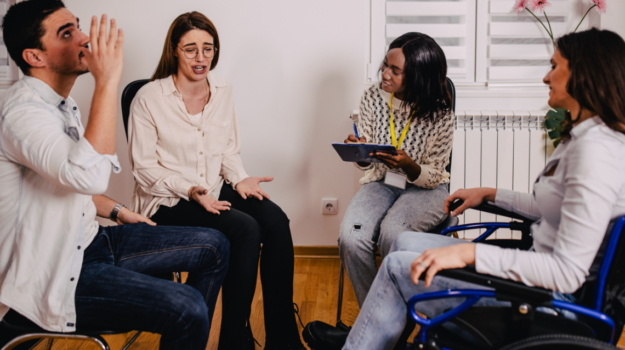Anxiety can present itself in many ways and profoundly affects someone’s life. It can manifest as physical symptoms, like sweating or a racing heart, or it can be emotional, causing feelings of fear or dread. An anxiety disorder can cause problems with concentration and sleep. If left untreated, anxiety can severely impact someone’s quality of life. Several different types of therapies can help to reduce anxiety levels and improve overall well-being. Cognitive behavioral therapy (CBT) is one of the most effective treatments for anxiety disorders. CBT works by helping people to identify and change negative thought patterns that contribute to their anxiety. Exposure therapy is another common type of therapy for anxiety disorders. It involves gradually exposing people to what the fear of in a controlled environment to learn to confront their fears without experiencing severe distress.
Different types of therapies
 Several therapies can help people who suffer from anxiety. Examples include cognitive behavioral therapy, exposure therapy, and Eye Movement Desensitization and Reprocessing (EMDR ). Cognitive behavioral therapy (CBT) is a type of talking therapy. It is standard treatment for a range of mental health problems. CBT teaches you coping skills for dealing with differenissuesms. It focuses on how your thoughts, beliefs and attitudes affect your feelings and actions where it helps people identify and change negative thinking patterns and behaviors contributing to anxiety. Exposure therapy gradually faces feared situations or objects in a safe and controlled environment.
Several therapies can help people who suffer from anxiety. Examples include cognitive behavioral therapy, exposure therapy, and Eye Movement Desensitization and Reprocessing (EMDR ). Cognitive behavioral therapy (CBT) is a type of talking therapy. It is standard treatment for a range of mental health problems. CBT teaches you coping skills for dealing with differenissuesms. It focuses on how your thoughts, beliefs and attitudes affect your feelings and actions where it helps people identify and change negative thinking patterns and behaviors contributing to anxiety. Exposure therapy gradually faces feared situations or objects in a safe and controlled environment.
The benefits of therapy
Many people who suffer from anxiety disorders or other mental health problems may benefit from therapy. Patients can learn about their condition and how to cope healthily. They can also explore the root causes of their anxiety and work through any underlying issues. The clarity obtained, leading to self-awareness, can be incredibly empowering and help sufferers take control of their lives. Therapy can also provide support and encouragement from someone who understands what you’re going through. The support and encouragement received are invaluable for anyone feeling isolated or alone in their struggle.
How to find a therapist
 There are many ways to find a therapist. You can ask your friends or family if they know anyone who would be a good fit for you. You can also look online or in the phone book. Once you have found someone, you should ensure they are a practicing psychologist and have experience treating anxiety disorders.
There are many ways to find a therapist. You can ask your friends or family if they know anyone who would be a good fit for you. You can also look online or in the phone book. Once you have found someone, you should ensure they are a practicing psychologist and have experience treating anxiety disorders.
Conclusion
Anxiety disorders share one common symptom: fear. Fear is a natural human emotion that helps keep us safe by alerting us to potential dangers. But it can be debilitating when it becomes overwhelming and prevents us from living normally. Fortunately, help is available in the form of therapy. With therapy, most people with anxiety disorders can overcome their symptoms and lead entire and happy lives.
If you are struggling with anxiety, we would highly recommend that you connect with an anxiety counseling therapist without delay and if you are a psychologist who wants to specialize in anxiety counseling then we would recommend PROS anxiety counseling certification.






